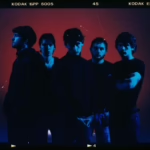Kishi Bashi has announced his new album Kantos will be released on August 23, 2024, via Joyful Noise Recordings. He has also shared the epic, soaring lead single “Colorful State;” an expressive, prog-tinged orchestral rock track, the song introduces an expanded sound for Kishi Bashi and is out now alongside a self-directed video. “‘Colorful State’ is a song about celebrating the complexities of our human lives, how we can feel that we’re in a constant flux between utter joy and sullen uncertainty, and everything in between,” explains Kaoru Ishibashi, aka Kishi Bashi. “This song is a warm embrace of that inevitability of change, and that for every sunset, there will always be a sunrise the next morning.” Self-produced and mixed by Tucan (Hot Chip, Jungle, Aluna)—and recorded at Chase Park Transduction with long time collaborator, engineer Drew Vandenberg (Faye Webster of Montreal, Toro y Moi), and British musicians Sweet Loretta—Kantos follows last fall’s Music from the Song Film: Omoiyari (the expansive companion soundtrack to his documentary A Song Film By Kishi Bashi: “Omoiyari”) and his acclaimed 2019 full-length, Omoiyari. The album also features additional guest musicians including Zorina Andall (vocals), Augie Bello (saxophone), and activist/rapper Linqua Franqa, and is now available for pre-order.
Kantos is a work of exquisite duality: a party album about the possible end of humanity as we know it, at turns deeply unsettling and sublimely joyful. In a sonic departure from the symphonic folk of Omoiyari—a career-defining body of work born from his intensive meditation on the mass incarceration of Japanese-Americans during World War II—the Seattle-born singer/songwriter/producer’s fifth studio album encompasses everything from Brazilian jazz and ’70s funk to orchestral rock and city pop (a Japanese genre that peaked in the mid-’80s). Informed by an equally kaleidoscopic mix of inspirations—the cult-classic sci-fi novel series Hyperion Cantos, the writings of 18th century enlightenment philosopher Immanuel Kant, a revelatory trip to ancient ruins on the island of Crete—Kantos ultimately serves as an unbridled exaltation of the human spirit and all its wild complexities. “At a time when so many people had begun to panic about AI and what it might mean for our future, I started working on this record as a way to explore the concept of grounding ourselves in our humanity,” says the Santa Cruz, California-based multi-instrumentalist. “The album title is a nod to Hyperion Cantos and to Immanuel Kant, but it also refers to ‘canto’ meaning ‘I sing’ in Spanish. The idea is that even with so much technological advancement, songs are still something we very much rely on to connect with other people.”
During the earliest stages of creating songs for Kantos, Ishibashi’s main intent was to return to his highly eclectic musical roots, in part by tapping into his jazz background and by delving into the dance-rock-leaning sensibilities he previously embraced as co-founder of Brooklyn-bred indie band Jupiter One. But not too long into the songwriting process, he stumbled upon an AI-equipped website capable of composing catchy song hooks based on a prompt—a turn of events that quickly catalyzed the existential inquiry at the heart of Kantos. “On the one hand I’m very intrigued by the possibilities of AI: it’s extremely powerful, and has the potential to solve a lot of important problems,” says Ishibashi. “But there’s also a great deal of value in human innovation, and I’m worried about what happens if we lose sight of that. Because if we don’t value our humanity, what are we valuing at all?”
Kantos unfolds with a potent and palpable energy that has much to do with his revisiting of the dance-punk acts who infiltrated the zeitgeist back in his Jupiter One days. “Being immersed in that whole scene in New York in the 2000s was very formative for me, and a lot of this record was heavily influenced by bands like The Rapture and LCD Soundsystem,” notes Ishibashi, whose past experience also includes touring and recording as a violinist for Regina Spektor. The album also partly draws its galvanizing power from his lockdown-era infatuation with electric guitar. “During the pandemic I got a Fender Strat and got really excited about the tone,” he says. “It reminded me of the stuff Nile Rodgers was making with Chic in the ’70s, and I made a conscious decision to build the demos around the guitar and all these cool drums loops I was playing around with.”
In bringing Kantos to life, Ishibashi found a wealth of inspiration in his partner Dr. Kimberly Dill, a philosophy professor at Santa Clara University. Dill, who also shares his love of Hyperion Cantos (a series set in a future in which humans uneasily coexist with AI civilization in colony worlds throughout the galaxy), introduced Ishibashi to the work of Kant (who emphasized “reason above all else”) and illuminated him on the evolution of human thought—including the potentially disastrous consequences of the transhumanist movement espoused by the likes of Elon Musk. “Those who subscribe to transhumanism are looking toward a distant future where humans exist on the mainframe, as if that’s a form of enlightenment,” says Ishibashi. “In many ways that’s fascinating to me, but I think runaway futurism becomes dangerous when we devalue the living. When you put reason above all else, it’s another way of detaching from humanity.”
Although his ruminations on AI, transhumanism, and humanity’s troubled fate indelibly guided the making of Kantos, Ishibashi nonetheless views the album as “less of a warning about this kind of hubris but more a celebration of the very characteristics that make us human: desire, passion, empathy, and love.” “If there’s anything I want people to come away with when they hear this record, it’s a feeling of excitement about the possibilities of human-created art,” he says. “Even as we’re learning more about all the amazing things AI can do, I think humans will always be one step ahead in terms of our creativity and innovation. There’s still no limit to what we have to offer.”
The Fire Note is an independent-music website that mixes record-store culture with lively, opinionated music journalism. It publishes: Album reviews and features – Covering indie-rock, punk, folk, experimental music, and underground scenes.





